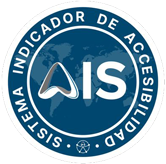AIS (Accessibility Indicator System) offers several technical and strategic competitive advantages, which help companies not only to comply with AIS standards, but also to position themselves as international accessibility leaders:
1. Flexible Grading System of the AIS accessibility certificate:
AIS is particularly unique for its graded rating system (from one to five stars), which allows assessing and certifying the level of accessibility in a step-by-step manner. This system helps companies to identify areas for improvement and allows users to easily recognise the accessibility level of a space or product.

The possibility of obtaining certification from one to five grades makes the AIS system accessible to all types of facilities, regardless of their initial level of accessibility.
2. International Coverage and Adaptability:
The AIS accessibility certificate stands out for its ability to adapt to local regulations in more than 30 countries through the use of transpositions, i.e. specific adjustments to the accessibility laws of each region. This is especially valuable for companies with an international presence seeking certification to support their compliance in different markets.
This feature not only ensures legal compliance, but also facilitates global standardisation and recognition of accessible environments under a single certification.

3. Integrated Outreach in Physical and Digital Environments:
AIS incorporates criteria for both physical environments and digital products and services, which is an advantage in a context where digital accessibility is becoming increasingly important. This makes it an ideal option for companies that want a complete and unified certification, rather than having to obtain separate certifications for each domain.
4. Usability and User Experience Orientation:
Unlike other certifications that may focus only on technical compliance, AIS also considers usability and the actual user experience in the environment. This involves assessing how people interact and feel in spaces, promoting an environment that is not only accessible but functional and comfortable for all users, which is key to its effectiveness and social acceptance.
5. Focus on Innovation and Continuous Improvement:
By implementing a grading system and providing advice to increase the level of accessibility, the AIS accessibility certification promotes continuous improvement, encouraging companies to evolve and improve their facilities. In addition, approved assessors or technicians and authorised entities provide technical guidance, promoting constant adaptation to new standards and advances in accessibility.
These characteristics position AIS as a certification that not only guarantees accessibility, but also promotes a comprehensive, practical vision that is aligned with current accessibility needs in the global environment.

